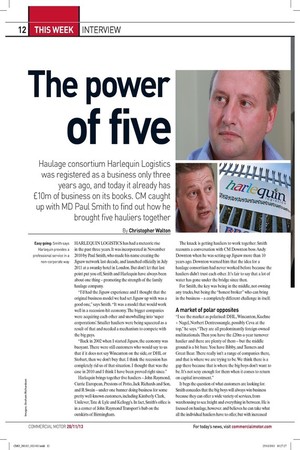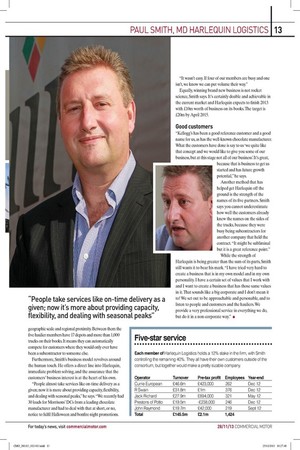The power of five
Page 9

Page 10

If you've noticed an error in this article please click here to report it so we can fix it.
Haulage consortium Harlequin Logistics was registered as a business only three years ago, and today it already has £10m of business on its books. CM caught up with MD Paul Smith to find out how he brought five hauliers together By Christopher Walton
HARLEQUIN LOGISTICS has had a meteoric rise in the past three years. It was incorporated in November 2010 by Paul Smith, who made his name creating the Jigsaw network last decade, and launched officially in July 2011 at a swanky hotel in London. But don't let that last point put you off, Smith and Harlequin have always been about one thing — promoting the strength of the family haulage company.
"I'd had the Jigsaw experience and I thought that the original business model we had set Jigsaw up with was a good one," says Smith. "It was a model that would work well in a recession-hit economy. The bigger companies were acquiring each other and snowballing into 'super corporations: Smaller hauliers were being squeezed as a result of that and needed a mechanism to compete with the big guys.
"Back in 2002 when I started Jigsaw, the economy was buoyant. There were still customers who would say to us that if it does not say Wincanton on the side, or DHL or Stobart, then we don't buy that. I think the recession has completely rid us of that situation. I thought that was the case in 2010 and I think I have been proved right since."
Harlequin brings together five hauliers — John Raymond, Currie European, Prestons of Potto, Jack Richards and Son, and R Swain — under one banner doing business for some pretty well-known customers, including Kimberly Clark, Unilever, Tate & Lyle and Kellogg's. In fact, Smith's office is in a comer of John Raymond Transport's hub on the outskirts of Birmingham.
The knack is getting hauliers to work together. Smith recounts a conversation with CM Downton boss Andy Downton when he was setting up Jigsaw more than 10 years ago. Downton warned him that the idea for a haulage consortium had never worked before because the hauliers didn't trust each other. It's fair to say that a lot of water has gone under the bridge since then.
For Smith, the key was being in the middle, not owning any trucks, but being the "honest broker" who can bring in the business — a completely different challenge in itself. A market of polar opposites
"I see the market as polarised: DIAL, Wincanton, Kuehne + Nagel, Norbert Dentresssangle, possibly Ceva at the top," he says. "They are all predominantly foreign-owned multinationals. Then you have the £20m-a-year turnover haulier and there are plenty of them — but the middle ground is a bit bare. You have Bibby, and Turners and Great Bear. There really isn't a range of companies there, and that is where we are trying to be. We think there is a gap there because that is where the big boys don't want to be. It's not sexy enough for them when it comes to return on capital investment." It begs the question of what customers are looking for. Smith concedes that the big boys will always win business because they can offer a wide variety of services, from warehousing to sea freight and everything in between. He is focused on haulage, however, and believes he can take what all the individual hauliers have to offer, but with increased
geographic scale and regional proximity. Between them the five haulier members have 17 depots and more than 1,000 trucks on their books. It means they can automatically compete for customers where they would only ever have been a subcontractor to someone else.
Furthermore, Smith's business model revolves around the human touch. He offers a direct line into Harlequin, immediate problem solving, and the assurance that the customers' business interest is at the heart of his own.
"People almost take services like on-time delivery as a given; now it is more about providing capacity, flexibility, and dealing with seasonal peaks," he says. "We recently had 30 loads for Mon-isons' DCs from a leading chocolate manufacturer and had to deal with that at short, or no, notice to fulfil Halloween and bonfire night promotions.
"It wasn't easy. If four of our members are busy and one isn't, we know we can put volume their way."
Equally, winning brand new business is not rocket science, Smith says. It's certainly doable and achievable in the current market and Harlequin expects to finish 2013 with £10m worth of business on its books. The target is £20m by April 2015. Good customers "Kellogg's has been a good reference customer and a good name for us, as has the well-known chocolate manufacturer. What the customers have done is say to us 'we quite like that concept and we would like to give you some of our business, but at this stage not all of our business: It's great,
because that is business to get us started and has future growth potential," he says.
Another method that has helped get Harlequin off the ground is the strength of the names of its five partners. Smith says you cannot underestimate how well the customers already knew the names on the sides of the trucks, because they were busy being subcontractors for another company that held the contract. "It might be subliminal but it is a great reference point." While the strength of Harlequin is being greater than the sum of its parts, Smith still wants it to bear his mark. "I have tried very hard to create a business that is in my own model and in my own personality. I have a certain set of values that I work with and I want to create a business that has those same values in it. That sounds like a big corporate and I don't mean it to! We set out to be approachable and personable, and to listen to people and customers and the hauliers. We provide a very professional service in everything we do, but do it in a non-corporate way." •







































